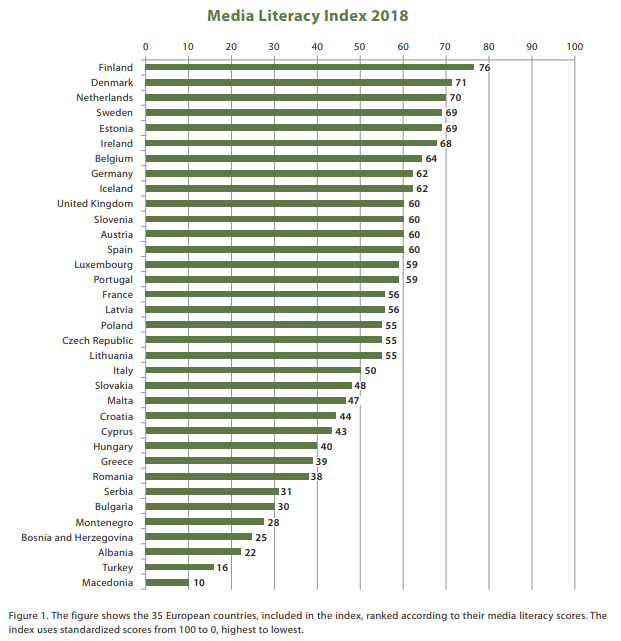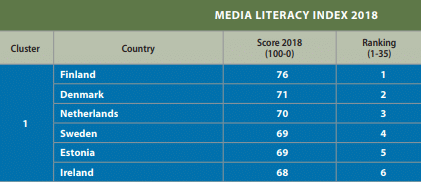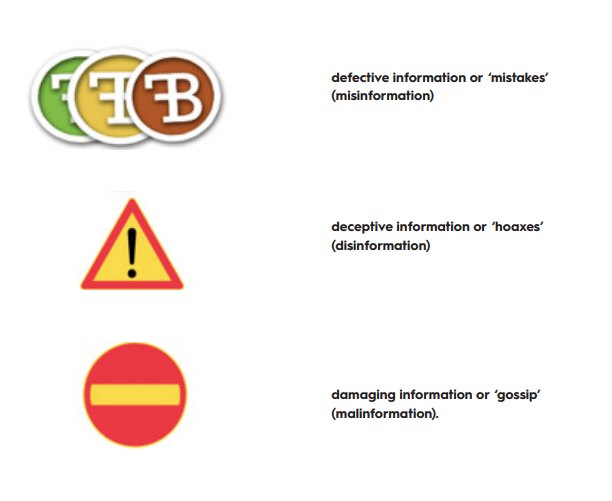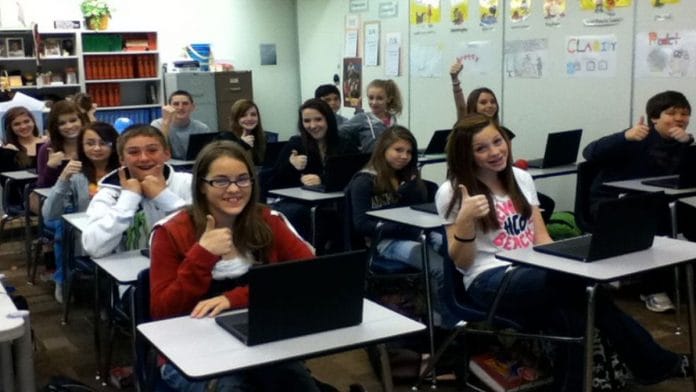Finland has an effective weapon to combat fake news: education.
The Nordic nation tops a list of European countries deemed the most resilient to disinformation, the Media Literacy Index, compiled by the Open Society Institute in Sofia.
Denmark was second, followed by the Netherlands, Sweden and Estonia. Macedonia, Turkey and Albania were bottom of the chart.
Policymakers around the globe have voiced the need to combat fake news and back in 2013, the World Economic Forum’s Global Risks Report warned that “digital wildfires” could spread false information rapidly.
While some countries, including Germany and France, are legislating to try to combat fake news, others say that could jeopardize free speech, and argue that education and awareness are better solutions. The Open Society Institute report agrees.
“High-quality education and having more and more educated people is a prerequisite for tackling the negative effects of fake news and post-truth,” the Media Literacy Index’s authors wrote. “While some regulation is necessary, education seems to be the best all-round solution.”

“We need to train a new generation of critical minds,” Jean-Pierre Bourguignon, President of the European Research Council told the World Economic Forum’s Annual Meeting of the New Champions in September. “We must tackle this issue through improved news literacy, and it is the task of our educators and society at large to teach children how to use doubt intelligently and to understand that uncertainty can be quantified and measured.”
Studies show a positive relationship between the level of education and resilience to fake news, the OSI report said, with more knowledge and better critical-thinking skills guarding against fabricated information. Finland, Sweden and the Netherlands are among countries that teach digital literacy and critical thinking about misinformation to school children.

Finnish fact-checking organisation Faktabaari (FactBar) adapts professional fact-checking methods for use in Finnish schools, and says good research skills and critical thinking are key. It outlines three areas to be aware of: misinformation (defective information or mistakes), disinformation, such as hoaxes, and malinformation, stories that intend to damage.

“Finland’s government considers the strong public education system as a main tool to resist information warfare against the country,” says Marin Lessenski, Programme Director for European Policies at OSI-Sofia. Widespread critical-thinking skills and a coherent government response are key to resisting fake-news campaigns, he says.
CNN @CNN has quoted our Media Literacy Index of OSI-Sofia (https://t.co/9bxFHJBOmK) in its material on #Finland’s approach to fighting #fakenews https://t.co/2epLIVwsEb
— Marin Lessenski (@marinlessenski) May 20, 2019
In recent national elections, Finland urged voters to think about fake news, with government-commissioned adverts encouraging them to choose independently.
Some people have questioned the actual impact of fake news. One academic study concluded that its influence is often overstated and said there was no credible evidence that fake news stories changed the outcome of the 2016 U.S. election.
“Encouragingly, we find a sizable drop in the proportion of Americans who were exposed to fake news websites,” since 2016, that report says. “Though the trend for total fake news consumption as a share of people’s information diets is less clear. Our data also indicate that consumption of these sites continues to be concentrated among a small subset of Americans with strong preferences for ideological media, especially those with the most conservative media diets.”
This article was originally published on WEF.






